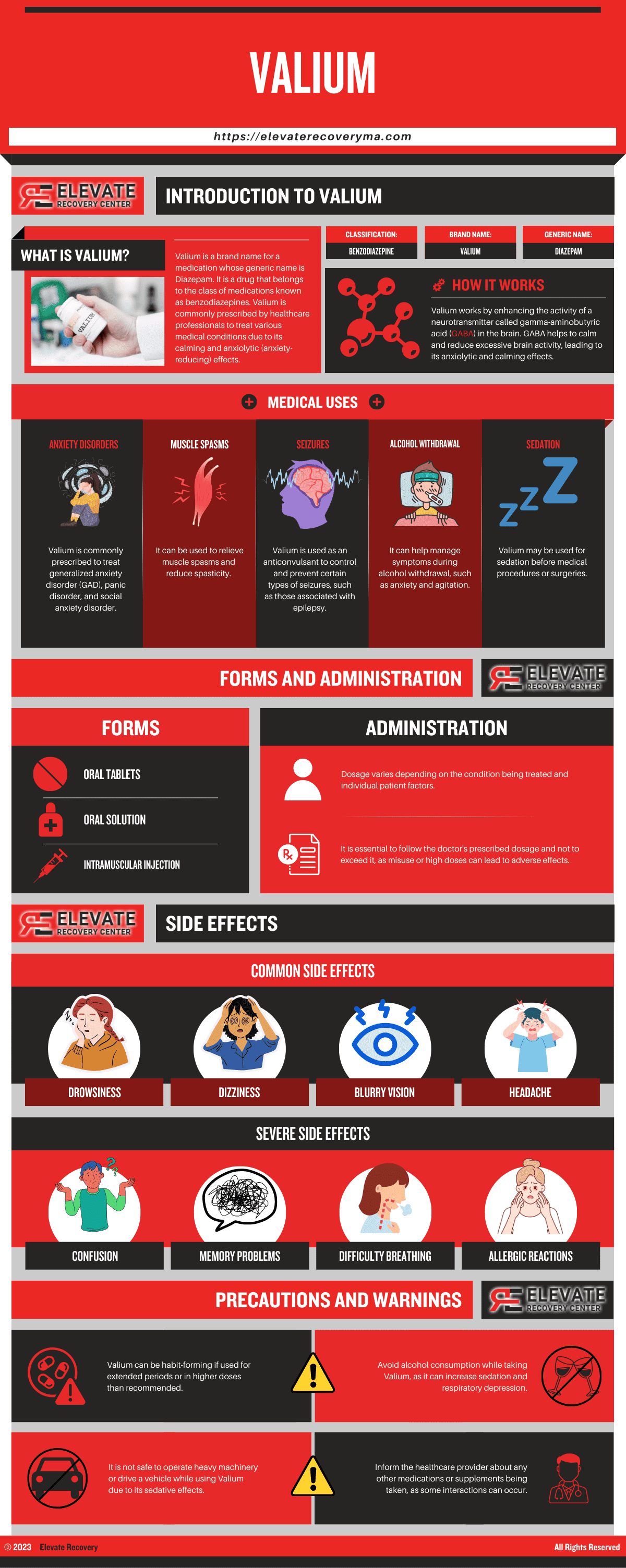What is Valium?
Valium–also called by its generic name, diazepam– is a prescription benzodiazepine medication. People may take Valium to manage symptoms of anxiety, tremors, alcohol withdrawal, or seizures.
Valium and other benzodiazepine drugs are among the most commonly-prescribed medications in the United States. These types of medications work by enhancing the effects of a neurotransmitter called GABA, which calms the brain’s activity. When people take Valium, they often experience feelings of calm, sedation, and muscle relaxation.
Valium is available in tablet form and is taken orally. People who take Valium should not drink alcohol or take other sedative medication because it can cause serious, sometimes life-threatening complications.
Is Valium a Narcotic?
People sometimes use the term “narcotic” to describe any substance that is illegal or addictive. However, only certain types of drugs, including Vicodin and other opioid painkillers, are actually narcotic medications.
Valium is not a narcotic. It is a benzodiazepine medication. However, benzodiazepines and narcotics share some similarities. Opioids and benzodiazepines both depress activity in the central nervous system (CNS) and can cause euphoria and drowsiness.
While Valium is not a narcotic, both types of drugs have the potential to be addictive and may cause significant harm if misused.
The Effects and Risks of Valium
Some people who take Valium may experience unwanted side effects or face serious risks to their short and long-term health and well-being.
Side effects
People may experience:
- Drowsiness
- Muscle weakness
- Unsteadiness
- Fatigue
- Confusion
- Depression
- Headache
- Nausea
- Incontinence
- Skin reactions
- Blurred vision
- Slurred speech
- Low blood pressure
- Slow reaction times
- Memory loss
- Anti-social behaviors
- Dependence
Risks
People who take Valium are at risk of:
- Falling
- Motor vehicle accidents
- Worsening insomnia
- Hallucinations
- Aggression and rage
- Respiratory depression
- Coma
- Death
- Addiction
Valium may also cause further damage to people with kidney or liver disease, diabetes, and heart disease.
Withdrawal
Those who use Valium heavily or regularly are at risk of developing psychological and physical dependence on it. If someone with Valium dependence suddenly stops taking it, they will likely experience withdrawal symptoms that may include:
- Tremors
- Convulsions
- Cramps
- Nausea
- Vomiting
- Insomnia
- Sweating
Adverse side effects can happen to anyone who takes Valium but are more common among those who take it recreationally or misuse it in other ways.
Valium Abuse and Addiction
Valium abuse can occur if someone takes it differently than prescribed or without a prescription. The calming, euphoric effects of Valium may cause people to want to take it more frequently, in higher doses, or in other methods than their doctor told them to–or to take it recreationally.
People with Valium abuse and addiction can significantly alter a person’s thoughts, moods, and behaviors. They may feel anxious if they are running low on Valium, take it every day, or do illegal things to get more.
Valium abuse can lead to addiction. Addiction means that a person has lost control over their substance use and needs to take the drug to function normally. Addiction is a serious and complex condition that requires comprehensive treatment and ongoing support.
Do I Need Valium Addiction Treatment?
Recognizing substance abuse is the first step toward getting the help you need to recover. Identifying prescription drug abuse can sometimes be difficult, but there are typically some recognizable signs.
Here are some of the most common signs of Valium addiction.
- You use Valium every day
- You take Valium right after waking up
- You feel anxious if your supply is running low
- You make sure you always have Valium available
- If you try to stop taking it, you experience cravings or withdrawal symptoms
- You take Valium without a medical reason
- Over time, you find you need to take more Valium to get the effects you want
- You have done–or are willing to do–something illegal to get more Valium
- You continue to take Valium even though it has harmed your health, ability to function, relationships, or other aspects of your life
In others, you may notice:
- Tremors
- Poor balance or coordination
- Excessive sleepiness
- Changes in hygiene or appearance
- Slower speech and movements
If you notice the signs of Valium abuse in yourself or someone you love, seek help immediately. The sooner you get help, the better your chances are of having a full recovery.
Get Help for Valium Abuse and Addiction Now
Substance abuse and addiction can harm your health, emotional well-being, relationships, and more. If you or someone you love lives with substance abuse or addiction, you must get treatment to overcome these conditions and work toward a healthier, sober lifestyle.
Reach out to the caring specialists at our Massachusetts rehab center now to explore our treatment programs. Don’t live the life addiction chooses for you. Regain control over your future. Call us today to get started.


